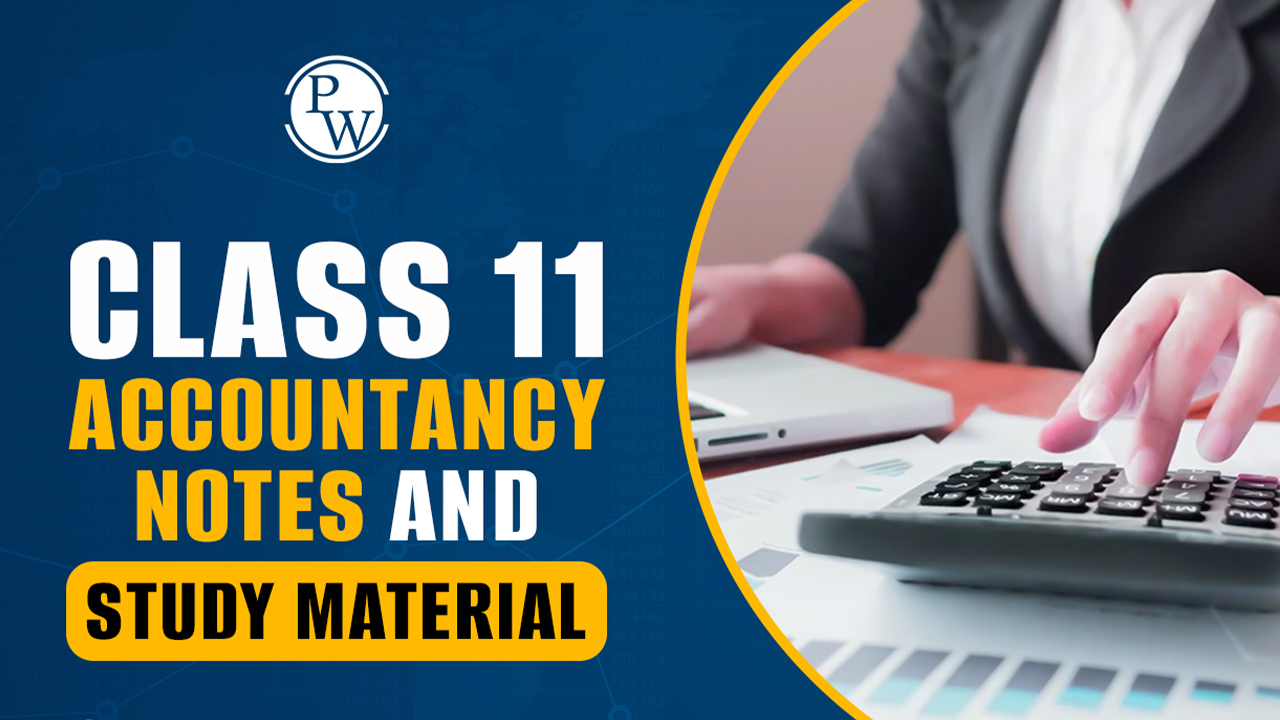Class 11 Accountancy Notes and Study Material

Accountancy Class 11:- Class 11 Accountancy Notes are designed to clarify fundamental accounting principles and practices. These notes cover crucial concepts, accounting techniques, and practical examples, breaking down complex topics into straightforward points. They emphasise key elements from each chapter of the NCERT Class 11 Accountancy textbook, facilitating quick review and deep comprehension. The Revision Notes include summary points, essential formulas, and practice questions, making them perfect for efficient last-minute revision and thorough study. Check out the accountancy class 1 notes below.
Introduction to Accounting Class 11 Notes
Chapter 1: Introduction to Accounting
This chapter introduces the basics of accounting, focusing on foundational concepts. It provides an overview of key terms such as capital, profit, loss, drawings, purchases, and sales, aimed at establishing a solid understanding for further study. The notes highlight the significance of accounting information and its various users, setting the stage for more advanced topics.
Chapter 2: Theory Base of Accounting
In this chapter, the fundamentals of accounting and accounting standards are explored. The notes delve into core concepts such as the Business Entity Concept, Going Concern Concept, Cost Concept, and Matching Concept. Additionally, the chapter covers Single and Double Entry Systems of Accounting, offering a comprehensive look at the theoretical underpinnings of accounting practices.
Check out CBSE Class 11 Accountancy Volume 1 Chapter-wise Textbook
Chapter 3: Recording of Business Transactions
This chapter focuses on the practical aspects of recording business transactions. It details how to record transactions, where to record them, and the process of transferring information from the Journal to the Ledger. Key topics include Accounting Equation, Journal Entries, Cash Book, Sales Book, and Ledger, with explanations, structures, and examples provided to support a thorough understanding.
Chapter 4: Bank Reconciliation Statement
The fourth chapter addresses the Bank Reconciliation Statement, explaining its definition, structure, and practical examples. The notes guide you through the process of reconciling the Cash Book with the Pass Book, ensuring that discrepancies are identified and corrected.
Chapter 5: Depreciation, Provisions, and Reserves
This chapter covers Depreciation, Provisions, and Reserves, focusing on how to account for these elements. It includes explanations of Depreciation, its accounting treatment, and methods for calculating it (SLM and WDV Methods). The notes also discuss Reserves, Provisions, and various types of Reserves, providing detailed information and examples for better comprehension.
Chapter 6: Trial Balance and Rectification of Errors
Chapter 6 deals with the preparation of the Trial Balance and the rectification of errors. The notes explain the methodology and purpose of preparing a Trial Balance, as well as addressing important topics like Suspense Accounts, Error Rectification, and Error Detection in the Trial Balance.
Chapter 7: Financial Statements
The final chapter in Accountancy Part-B offers a detailed explanation of financial statements. The notes cover the reasons for preparing financial statements, their significance for various business stakeholders, and key concepts such as capital, revenue, and operating profit. This chapter provides insights into the preparation and analysis of financial statements, crucial for understanding the financial health of a business.
Check out CBSE Class 11 Accountancy Volume 2 Chapter-wise Textbook
Benefits of Accountancy Class 11 Notes
-
Clear Understanding of Concepts
Class 11 Accountancy notes present complex principles in a straightforward manner, helping students easily grasp fundamental concepts. This clarity ensures a solid foundation for more advanced topics. -
Focused Study
With study material organised by chapter, students can concentrate on specific areas, ensuring they cover each part of the syllabus comprehensively. -
Efficient Revision
Notes packed with summary points, key formulas, and sample questions make revision straightforward and effective. Students can quickly refresh their memory and solidify their understanding before exams.Check out: Commerce Class 11th -
Practical Examples
Real-life examples and scenarios included in the notes bridge the gap between theory and practice, helping students apply what they've learned to practical situations. -
Comprehensive Coverage
Detailed explanations of all essential topics, from recording transactions to preparing financial statements, ensure students gain a thorough understanding of the subject. -
Enhanced Exam Preparation
Sample questions and practice problems familiarise students with the types of questions they may face in exams, boosting their confidence and readiness. -
Effective Learning Tool
Simplified and summarised notes serve as valuable resources for both initial learning and ongoing review, aiding students in their studies. -
Time Management
The structured approach provided by the notes helps students manage their study time efficiently, focusing on key areas and avoiding unnecessary details. -
Improved Accuracy
By understanding the correct methods for accounting practices, students reduce the likelihood of making errors in their work, leading to more accurate assignments and exam answers. -
Boosted Confidence
With a strong grasp of accounting concepts and ample practice, students gain confidence in their ability to tackle accountancy problems and excel academically.
Check out: Commerce Class 12th
CBSE Class 11 Accountancy Notes PDFs Download
Accountancy in Class 11 is an important subject that covers many key concepts and principles. To do well, students need comprehensive study materials. Notes are essential for reviewing each chapter and retaining what’s been learned.
For effective revision, you can download and use the PW faculty’ Class 11 Accountancy Notes. These notes help you understand and remember the material more quickly, which is crucial for doing well in your tests.
CBSE Class 11 Accountancy Notes PDFs
Accountancy Class 11 FAQs
Q1. What are the key topics covered in Class 11 Accountancy?
Ans. Class 11 Accountancy covers essential topics such as Introduction to Accounting, Theory Base of Accounting, Recording of Business Transactions, Bank Reconciliation Statements, Depreciation, Provisions and Reserves, Trial Balance and Rectification of Errors, and Financial Statements.
Q2. How can I effectively revise for Class 11 Accountancy exams?
Ans. Effective revision involves using comprehensive study notes, practising with sample questions, and reviewing key concepts and formulas. Regularly summarising chapters and focusing on problem areas will also help.
Q3. What are the good resources for studying Class 11 Accountancy?
Ans. The good resources include detailed study notes, textbooks, online tutorials, and practice papers. Additionally, using materials from faculty, like the PW Class 11 Accountancy Notes, can provide valuable insights and support.
Q4. How can I improve my understanding of complex accounting concepts?
Ans. To better understand complex concepts, break them down into smaller parts, use real-life examples, and practice solving related problems. Seeking help from teachers or online forums can also be beneficial.
Q5. What is the importance of the Bank Reconciliation Statement?
Ans. The Bank Reconciliation Statement is crucial for ensuring that the Cash Book and Pass Book balances match. It helps identify discrepancies and correct errors in bank records.












